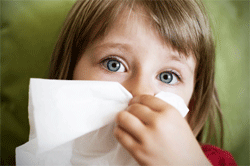 The flu is still a serious illness, especially for small infants and anyone who has a weakened immune system or asthma. For most healthy kids who contract influenza, they will be very sick for a few days and then recover fully, but every year, a few healthy children and teens become seriously ill from influenza. Vaccination is key to preventing widespread flu outbreaks, however, what if your child was not immunized this year. You may begin to worry about every sniffle. wondering is this the flu or just a simple cold. Here are some guidelines to help you tell the difference.
The flu is still a serious illness, especially for small infants and anyone who has a weakened immune system or asthma. For most healthy kids who contract influenza, they will be very sick for a few days and then recover fully, but every year, a few healthy children and teens become seriously ill from influenza. Vaccination is key to preventing widespread flu outbreaks, however, what if your child was not immunized this year. You may begin to worry about every sniffle. wondering is this the flu or just a simple cold. Here are some guidelines to help you tell the difference.
The common cold lasts about 9-10 days and is sometimes described as three days coming, three days here and three days going. The first three days your child may have a fever. In infants and toddlers the temperature might reach 103-104, but after giving some acetaminophen or ibuprofen, the temperature will be lower and your baby will seem better. In older children there might be a low-grade fever or none at all. But here comes the runny nose. A cold always causes a runny nose, but the flu usually does not.
During the middle phase of a cold, a child may develop a cough because of the congestion from the nose, however it will not be a deep or hacking cough as we see when a child has the flu, and usually there is no chest pain. During this time the fever is usually gone, and your child might be back to their activities, despite the runny nose and mild cough.
The final three days is when the mucous starts to thicken and become crusty. At this point it’s just wiping the nose and using humidifiers to help your child breathe easier at night.
The symptoms of flu are very specific and include high fever (usually lasting 4 – 6 days), sore aching muscles, generalized weakness, headache, pain behind the eyeballs, a sore throat and hacking cough.
The uncomplicated flu lasts 7 – 10 days and does not respond to antibiotics.Your pediatrician can decide if an antiviral such as oseltamivir (Tamiflu) would be appropriate. Treatment includes plenty of fluids, bed rest and acetaminophen or ibuprofen for fever, headache and body aches. For cough, try a mixture of honey and lemon (if older than 1 year), non-caffeine teas. Some studies even suggest that chicken soup has some merit. Try to avoid OTC cold medicines, especially in children younger than 2 years of age. Remember, to prevent Reye’s syndrome, a potentially fatal illness, never give aspirin to your child or adolescent with the flu. Consult your pediatrician or family physician if your child has difficulty breathing, chest pain, a cough that is preventing them from sleeping, or a prolonged fever.